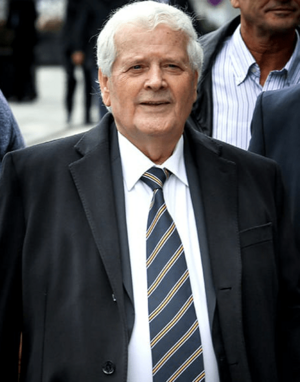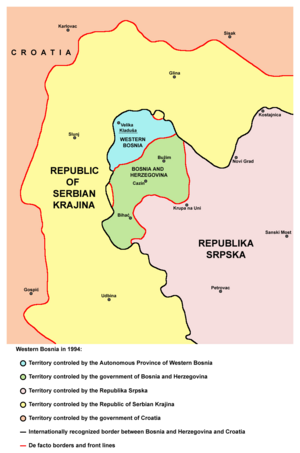Fikret Abdić facts for kids
Quick facts for kids
Fikret Abdić
|
|
|---|---|

Abdić in April 2025
|
|
| Municipal Mayor of Velika Kladuša | |
| In office 8 November 2016 – 15 November 2024 |
|
| Preceded by | Edin Behrić |
| Succeeded by | Boris Horvat |
| President of Western Bosnia | |
| In office 27 September 1993 – 21 August 1995 |
|
| Prime Minister | Zlatko Jušić |
| Preceded by | Post established |
| Succeeded by | Post abolished |
| 1st Muslim Member of the Presidency of the Republic of Bosnia and Herzegovina | |
| In office 20 December 1990 – 20 October 1993 Serving with Alija Izetbegović |
|
| Preceded by | Post established |
| Succeeded by | Nijaz Duraković |
| Personal details | |
| Born | 29 September 1939 Velika Kladuša, Yugoslavia (now Bosnia and Herzegovina) |
| Political party | SKJ (1958–1990) SDA (1990–1993) DNZ (1993–2013) LS BiH (2013–present) |
| Children | 4, including Elvira |
| Profession | Economist Businessman |
| Nickname | Babo |
Fikret Abdić (born 29 September 1939), also known by his nickname Babo (which means "Dad"), is a politician and businessman from Bosnia and Herzegovina. He became famous in the 1980s for leading a large food company called Agrokomerc.
During the Bosnian War in the 1990s, he disagreed with the Bosnian government. He created a small, separate state called the Autonomous Province of Western Bosnia. This region existed for a short time in the northwest part of the country.
After the war, a court in Croatia found him responsible for his actions during the conflict. He was sentenced to 20 years in prison, which was later lowered to 15 years. He was released in 2012 after serving part of his sentence. Abdić later returned to politics and was elected mayor of Velika Kladuša, serving until November 2024.
Early Life and Career
Fikret Abdić was born in the village of Donja Vidovska, near the town of Velika Kladuša, on 29 September 1939. At that time, the area was part of the Kingdom of Yugoslavia.
After studying agriculture, Abdić became the director of a small company called Agrokomerc. Under his leadership, Agrokomerc grew from a small farm cooperative into a huge, modern food company. It employed over 13,000 people and helped the entire region become more prosperous.
Agrokomerc turned Velika Kladuša from a poor area into a successful one. The company was known all over Yugoslavia for its popular products, like Tops biscuits, which were similar to Jaffa Cakes. Because he did so much for the town, many local people started calling him Babo, or "Father."
In 1987, a major financial scandal involving Agrokomerc occurred. The event became known as the Agrokomerc Affair. This scandal was a big deal not just in Bosnia and Herzegovina, but across all of Yugoslavia.
Entering Politics
After the fall of communism in Yugoslavia, new political parties were formed. In Bosnia and Herzegovina, people mostly voted for parties based on their ethnic group. Abdić joined the main party for Bosnian Muslims, the Party of Democratic Action (SDA).
In the 1990 election for the Presidency, Abdić received more votes than any other candidate, including the party's leader, Alija Izetbegović. However, Abdić agreed to step aside and let Izetbegović take the top position, becoming a member of the Presidency instead.
When the Bosnian War began, Abdić's ideas about how to solve the conflict were different from Izetbegović's. Abdić believed that talking and making agreements with the other sides was the only way to stop the fighting. This disagreement led to a major split between him and the government in Sarajevo.
The Bosnian War
In 1993, during the war, Abdić decided to create his own separate state. On 27 September 1993, he announced the formation of the Autonomous Province of Western Bosnia. This "mini-state" was located around his hometown of Velika Kladuša.
His new state worked with Serb forces against the official Army of the Republic of Bosnia and Herzegovina (ARBiH). This created a conflict between Bosnian Muslims who supported Abdić and those who were loyal to the government in Sarajevo. Abdić's forces set up camps for people who fought against them.
The creation of this separate state was not supported by everyone. The 5th Corps of the Bosnian army, which was based nearby, fought against Abdić's forces. In 1994, the Bosnian army defeated his forces during a military mission called Operation Tiger.
However, with help from Serb forces, Abdić was able to retake control of the area. But this success did not last long. In August 1995, the Croatian and Bosnian armies launched Operation Storm. They quickly took over the territory of Western Bosnia, and Abdić's mini-state came to an end. He then fled to Croatia.
Life After the War
After the war, Abdić was given protection and citizenship in Croatia by its president, Franjo Tuđman. He lived near the city of Rijeka.
The government of Bosnia and Herzegovina wanted him to face charges for his role in the war, but Croatia did not send him back. After Tuđman's death in 1999, the new Croatian government arrested Abdić. In 2002, a court found him guilty of war crimes and sentenced him to 20 years in prison. This sentence was later reduced to 15 years.
On 8 March 2012, he was released from prison after serving ten years. Thousands of his supporters from Velika Kladuša traveled to greet him.
Abdić returned to politics and ran for mayor of Velika Kladuša in the 2016 Bosnian municipal elections. He won the election with 48.1% of the vote. He won re-election in the 2020 Bosnian municipal elections. In June 2020, while he was mayor, he was arrested as part of an investigation into how the city was being run. He served as mayor until 15 November 2024.
See also
- Elvira Abdić-Jelenović


